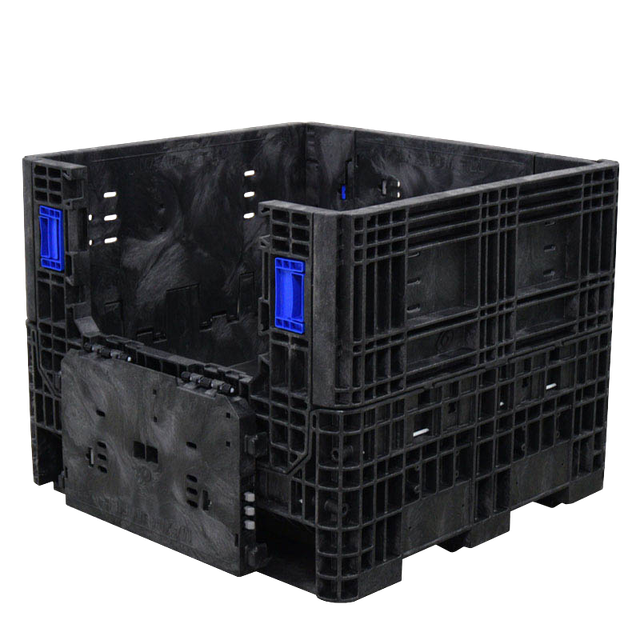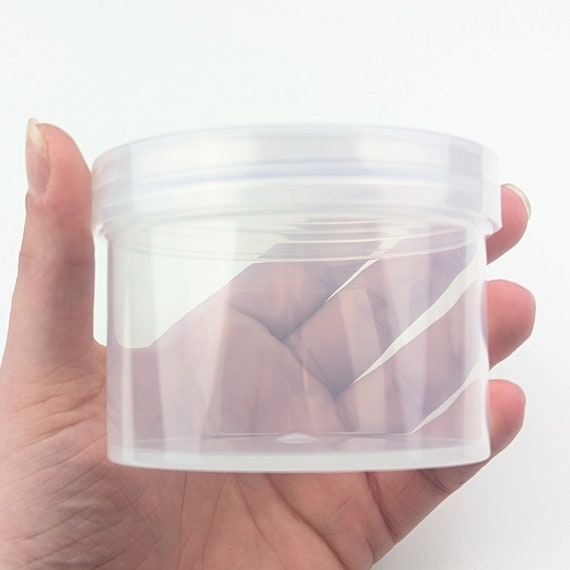A Comprehensive Overview to the Various Kinds of Bulk Plastic Containers Available Today
Mass plastic containers play a crucial duty in different markets, using options for storage space and transport. Their varied kinds satisfy different needs, from rigid choices for solid products to versatile containers accommodating various forms. Each kind provides distinct advantages, making it necessary to understand their applications and attributes. As sectors develop, so do the needs for effective container services. What factors should one consider when picking the ideal bulk container?
Overview of Bulk Plastic Containers

Kinds of Mass Plastic Containers
Mass plastic containers can be found in numerous kinds, each matched to specific applications. Rigid bulk containers, versatile bulk containers, and intermediate bulk containers represent the main classifications, each offering distinct benefits. Recognizing these types is necessary for picking the right container for carrying and saving products.

Inflexible Mass Containers
Stiff bulk containers are essential for efficient storage space and transport of various products throughout markets. These containers are generally constructed from durable plastics, permitting them to withstand rough handling and ecological problems. They are available in various forms and dimensions, consisting of containers, totes, and drums, making them suitable for saving everything from granular substances to liquids. Inflexible containers frequently feature reinforced wall surfaces and safe and secure covers, ensuring the materials continue to be shielded throughout transportation. Their stackable layout makes the most of storage room, making them excellent for stockrooms and making centers. Furthermore, numerous rigid mass containers are recyclable and recyclable, adding to sustainability efforts. On the whole, their effectiveness and flexibility make inflexible mass containers an essential part in supply chain operations.
Adaptable Bulk Containers
Adaptable bulk containers, often described as flexible intermediate bulk containers (FIBCs), offer as a flexible remedy for keeping a variety and moving of dry products. These containers are usually made from woven polypropylene and are designed to be light-weight yet strong, permitting for effective handling and stacking. Their versatility allows them to fit numerous sizes and shapes, making them appropriate for products ranging from grains to chemicals. FIBCs can be furnished with attributes such as spouts for easy filling and discharge, as well as protective coatings for improved resilience. In addition, they are reusable and recyclable, adding to lasting practices in markets such as farming, food handling, and construction. Overall, versatile bulk containers use a economical and efficient option for mass material management.
Intermediate Mass Containers
Intermediate bulk containers (IBCs) are vital for the effective transport and storage of liquids and granular materials across different industries. These containers typically have a capacity ranging from 275 to 330 gallons and are made for simple stacking and dealing with. Made from long lasting products like high-density polyethylene or steel, IBCs supply exceptional security against contamination and environmental aspects. Their design consists of attributes such as an integrated pallet for forklift accessibility and a detachable top for very easy dental filling and cleansing. IBCs are extensively made use of in chemical, food, and pharmaceutical fields, ensuring conformity with safety and security laws. Their versatility and reusability make them an economical remedy for mass storage space and transport, contributing to supply chain performance and sustainability.
Functions and Benefits of Mass Plastic Containers
Bulk plastic containers are important devices in different markets, offering a mix of durability and usefulness. These containers are built from top quality materials, making them immune to influences, chemicals, and ecological factors. This effectiveness assurances product safety and security during storage space and transportation.
Additionally, bulk plastic containers are light-weight, promoting convenience of managing and decreasing shipping costs. Their stackable layout takes full advantage of storage efficiency, permitting for maximized stockroom space. Many versions include safe and secure covers or closures, supplying an airtight seal that maintains contents and prevents contamination.
Bulk plastic containers are typically multiple-use and recyclable, contributing to lasting methods. Their versatility enables a variety of applications, from food storage space to industrial use, improving their worth throughout fields. Businesses benefit from the long life expectancy and reduced upkeep needs of these containers, making them an affordable service for both long-lasting and short-term requirements.
Industries That Use Bulk Plastic Containers
Various industries take advantage of the use of bulk plastic containers, each leveraging their distinct residential or commercial properties for certain applications. The food and beverage market relies upon these containers for safe storage space and transport of products, while the chemical manufacturing industry utilizes them for managing harmful products. Furthermore, the pharmaceutical circulation requires stress the importance of resilience and sanitation in product packaging options.
Food and Beverage Industry
As the demand for risk-free and efficient storage solutions proceeds to climb, the food and drink sector significantly counts on mass plastic containers for their operational needs. These containers provide robust, light-weight, and functional alternatives for keeping components, completed products, and waste products. Made from food-grade materials, they guarantee compliance with health and security standards. Numerous layouts, such as stackable bins and tote boxes, maximize space throughout transport and storage, boosting logistical effectiveness. Additionally, the transparency of some bulk containers permits simple inventory monitoring, minimizing the danger of spoilage. With the sector's focus on sustainability, numerous manufacturers are currently offering reusable and recyclable choices, straightening with green practices while satisfying the high needs of food safety and hygiene.
Chemical Manufacturing Industry
The chemical production sector depends greatly on bulk plastic containers for the safe and efficient storage of resources, intermediates, and finished products. These containers are developed to withstand numerous chemicals, making certain that harmful materials do not leakage or weaken the container itself. Typical types consist of high-density polyethylene (HDPE) and polypropylene containers, which supply outstanding chemical resistance and durability. Their lightweight nature and stackable design assist in transportation and storage, maximizing space in manufacturing facilities. Furthermore, lots of mass plastic containers come with attributes such as tamper-evident seals and easy-to-read labeling, improving security and conformity with market policies. On the whole, bulk plastic containers are indispensable to the chemical manufacturing procedure, giving trustworthy options for dealing with varied compounds.
Drug Distribution Needs
Drug circulation relies upon bulk plastic containers to satisfy rigid security and governing you could try here requirements. These containers are important for moving and saving a range of pharmaceutical products, consisting of active pharmaceutical components (APIs) and ended up medications. Their style assurances defense versus light, moisture, and contamination, maintaining the stability of delicate materials. Furthermore, mass plastic containers are compliant with market requirements such as Great Manufacturing Practices (GMP) and are frequently made from products that are FDA-approved. The usage of these containers boosts effectiveness in the supply chain, allowing for safe, large-scale circulation while lessening waste. Companies in the pharmaceutical market focus on using sturdy, watertight, and tamper-evident containers to assure product safety and security and high quality throughout the logistics procedure.
Factors to consider for Choosing the Right Container
When selecting the suitable mass plastic container, numerous aspects should be carefully weighed to guarantee optimal functionality and safety and security. The nature of the products to be stored is critical; compatibility with the container's product can affect stability and safety and security. plastic bulk containers. Additionally, the container's dimension and shape should straighten with the storage and transportation needs, guaranteeing efficient room usage
Tons capability is an additional crucial consideration, as it ought to suit the weight of components without danger of damages or failure. The design functions, such as airing vent or lids, can influence usability and gain access to. Conformity with market regulations is crucial, especially in sectors like pharmaceuticals, where safety standards are strict.
Ultimately, the anticipated life-span and durability of the container ought to be analyzed to verify it meets the operational requirements without constant replacement. By assessing these factors, one can select the most suitable mass plastic container for particular applications.
Environmental Influence and Sustainability
As click site companies significantly focus on sustainability, the ecological influence of bulk plastic containers has actually come under scrutiny. These containers, typically made from materials such as polyethylene or polypropylene, contribute considerably to plastic waste otherwise handled properly. Their manufacturing involves the consumption of fossil fuels, which can lead to enhanced greenhouse gas discharges. Nonetheless, innovations in reusing innovation and the advancement of naturally degradable alternatives are assisting to alleviate these concerns.
In addition, lots of manufacturers are taking on practices that stress using recycled materials, thereby lowering the need for virgin plastics. The resilience of bulk plastic containers additionally plays a function; they are designed to be recycled numerous times, which can reduce their total environmental impact when compared to single-use options. Inevitably, the sector faces the challenge of stabilizing performance with environmental responsibility, making lasting methods crucial for the future of bulk plastic containers.
Ideal Practices for Storage and Transport
Effective storage space and transportation of mass plastic containers considerably affect both functional effectiveness and sustainability. To make best use of area, organizations need to stack containers firmly, ensuring security and protecting against damage. Appropriate labeling is crucial for very easy identification, which streamlines retrieval procedures. In addition, keeping a orderly and tidy storage space location decreases the threat of contamination and improves safety and security.
For transportation, picking the best lorry is crucial; containers ought to be safeguarded to stay clear of shifting throughout transportation. Business must additionally consider utilizing pallets to promote much easier loading and discharging. Normal assessments of containers for wear and tear can stop pricey substitutes.
Temperature control is one more crucial facet, as extreme problems can endanger the stability of the plastic. Finally, training personnel on best practices for managing and transport warranties compliance and advertises a society of security. By applying these finest methods, services can improve their functional efficiency while adding to ecological sustainability.
Frequently Asked Questions
How Do I Clean Bulk Plastic Containers Effectively?
To tidy mass plastic containers effectively, one should wash them with warm water, use a moderate detergent and scrub with a soft brush. Wash thoroughly, after that permit to air dry completely prior to storage space or reuse.
What Is the Lifespan of Mass Plastic Containers?
The lifespan of bulk plastic containers generally varies from 5 to 10 years, relying on the material, usage, and environmental problems. Proper maintenance and storage space can significantly prolong their use and sturdiness with time.
Can Bulk Plastic Containers Be Customized?

Do Mass Plastic Containers Have Warranty Options?

Exist Laws for Making Use Of Bulk Plastic Containers?
Yes, regulations exist for navigate to this site using bulk plastic containers, largely focused on safety, environmental impact, and product conformity. These regulations guarantee that containers fulfill industry criteria and are appropriate for delivering numerous materials safely and efficiently.
Inflexible bulk containers, versatile bulk containers, and intermediate mass containers represent the main classifications, each offering distinct benefits. Versatile mass containers, typically referred to as adaptable intermediate mass containers (FIBCs), offer as a versatile solution for carrying and keeping a range of dry materials. The chemical manufacturing field relies greatly on bulk plastic containers for the risk-free and effective storage space of raw products, intermediates, and ended up products. plastic bulk containers. These containers are made to hold up against different chemicals, making certain that hazardous materials do not leakage or weaken the container itself. Furthermore, bulk plastic containers are compliant with sector requirements such as Excellent Production Practices (GMP) and are often made from materials that are FDA-approved